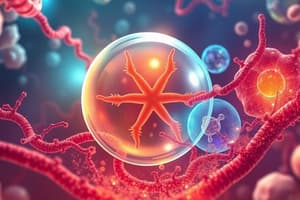Podcast
Questions and Answers
What acts as the final acceptor of electrons in the aerobic metabolism of glucose?
What acts as the final acceptor of electrons in the aerobic metabolism of glucose?
- Oxygen (correct)
- Ubiquinone
- Carbon dioxide
- Nitrate
What is the process of forming mRNA called?
What is the process of forming mRNA called?
- Translocation
- Translation
- Transcription (correct)
- Replication
Which enzyme is inhibited by high ATP concentrations during feedback inhibition?
Which enzyme is inhibited by high ATP concentrations during feedback inhibition?
- Pyruvate kinase
- Hexokinase
- Phosphofructokinase (correct)
- Lactate dehydrogenase
In the reaction A + B → C + D, what is/are the reactant(s)?
In the reaction A + B → C + D, what is/are the reactant(s)?
What is the definition of metabolism?
What is the definition of metabolism?
What type of transport is facilitated diffusion?
What type of transport is facilitated diffusion?
What is produced during the aerobic metabolism of glucose compared to anaerobic pathways?
What is produced during the aerobic metabolism of glucose compared to anaerobic pathways?
How many CO2 molecules are produced for each glucose molecule that is completely catabolized?
How many CO2 molecules are produced for each glucose molecule that is completely catabolized?
Which key intermediate of glucose catabolism enters the citric acid cycle?
Which key intermediate of glucose catabolism enters the citric acid cycle?
What is the potential yield of ATP molecules for each FADH2 molecule entering the electron transport system?
What is the potential yield of ATP molecules for each FADH2 molecule entering the electron transport system?
What happens to an enzyme when it is denatured by heat or a change in pH?
What happens to an enzyme when it is denatured by heat or a change in pH?
In the reaction CO2 + H2O -> H2CO3, which term describes carbonic anhydrase?
In the reaction CO2 + H2O -> H2CO3, which term describes carbonic anhydrase?
What are most enzymes primarily composed of?
What are most enzymes primarily composed of?
Why are many vitamins important in the human body?
Why are many vitamins important in the human body?
Which type of membrane transporter is activated by a change in ion concentration?
Which type of membrane transporter is activated by a change in ion concentration?
What role do enzymes play in chemical reactions?
What role do enzymes play in chemical reactions?
Study Notes
Aerobic Metabolism of Glucose
- Oxygen is the final electron acceptor in aerobic glucose metabolism
- Glucose metabolism with oxygen produces more ATP than anaerobic pathways
Cellular Processes
- Transcription: The process of forming mRNA (messenger RNA) from DNA
- Metabolism: The sum of chemical reactions in an organism.
Membrane Proteins
- Ligand Binding: Ligands bind to specific proteins and can be changed by the protein.
- Enzymes: Biological catalysts that accelerate chemical reactions.
- Cell-to-cell Connections: Certain membrane proteins form connections between cells.
- Transporters: Specific membrane proteins help molecules enter or exit the cell.
Transport Processes
- Facilitated Diffusion: A form of mediated transport that uses membrane proteins to transport substances across a cell membrane.
ATP Production
- Energy for ATP synthase in mitochondria comes from H+ (hydrogen ions)
- Acetyl-CoA is a key intermediate in glucose catabolism that enters the citric acid cycle.
- Each FADH2 molecule yields a potential of 3 ATP molecules through the electron transport system.
- Each mitochondrial NADH molecule entering the electron transport system does not produce ATP directly.
Enzymes
- Allosteric modulator: A molecule that binds to a region of an enzyme outside the active site, influencing its activity.
- Denatured enzyme: An enzyme whose structure is disrupted due to heat or pH changes, rendering it inactive.
- Enzymes increase the rate of chemical reactions.
- Kinase is a class of enzymes that transfer phosphate groups from ATP to substrates.
Membrane Transport
- Voltage-gated Channels: Membrane transport proteins that are activated by changes in ion concentrations.
Studying That Suits You
Use AI to generate personalized quizzes and flashcards to suit your learning preferences.
Related Documents
Description
Test your knowledge on key concepts of aerobic metabolism, cellular processes, and membrane proteins. This quiz covers ATP production, transcription, and the roles of various transport proteins. Perfect for students delving into cellular biology topics.




